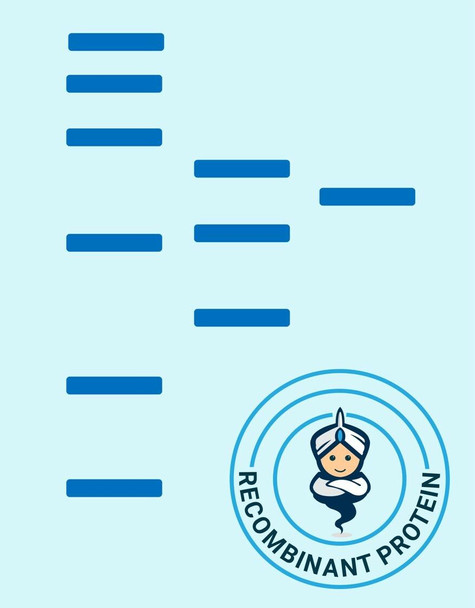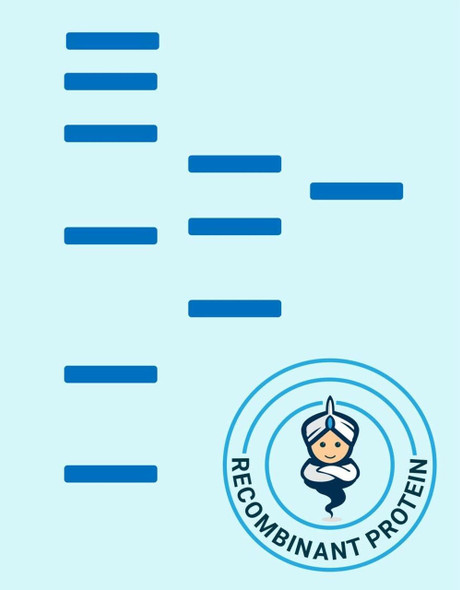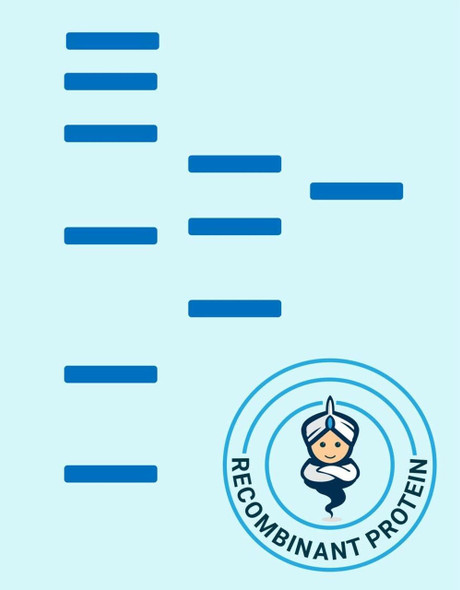Human IL 12 p40 Recombinant Protein (RPPB0568)
- SKU:
- RPPB0568
- Product Type:
- Recombinant Protein
- Species:
- Human
- Uniprot:
- P29460
- Research Area:
- Cytokines
Description
| Product Name: | Human IL 12 p40 Recombinant Protein |
| Product Code: | RPPB0568 |
| Size: | 10µg |
| Species: | Human |
| Target: | IL 12 p40 |
| Synonyms: | NKSF2, CTL maturation factor (TCMF), Cytotoxic lymphocyte maturation factor 40 kDa subunit (CLMF p40), TSF, Edodekin-alpha, IL-12 p40, IL-12B, IL-12 subunit p40, NK cell stimulatory factor chain 2. |
| Source: | Escherichia Coli |
| Physical Appearance: | Sterile Filtered clear solution. |
| Formulation: | Interleukin-12 p40 His is supplied in 1xPBS and 50% glycerol. |
| Stability: | Store at 4°C if entire vial will be used within 2-4 weeks. Store, frozen at -20°C for longer periods of time. Please avoid freeze thaw cycles. |
| Purity: | Greater than 95.0% as determined by�SDS-PAGE. |
Active IL-12 is a p70 disulphide-linked dimer composed of p35 and p40 subunits. The protein is a pleiotropic cytokine produced primarily by antigen presenting cells and has multiple effects on T lymphocytes and natural killer cells in terms of stimulating cytotoxicity, proliferation, production of other cytokines and Th1 subset differentiation.
Interleukin-12 p40 His Human Recombinant produced in E.Coli is single, a non-glycosylated, polypeptide chain containing 306 amino acids fragment (23-328) with an amino-terminal hexahistidine tag. The IL-12 p40 His is purified by proprietary chromatographic techniques.
| UniProt Protein Function: | IL12B: Cytokine that can act as a growth factor for activated T and NK cells, enhance the lytic activity of NK/lymphokine- activated killer cells, and stimulate the production of IFN-gamma by resting PBMC. Defects in IL12B are a cause of mendelian susceptibility to mycobacterial disease (MSMD); also known as familial disseminated atypical mycobacterial infection. This rare condition confers predisposition to illness caused by moderately virulent mycobacterial species, such as Bacillus Calmette-Guerin (BCG) vaccine and environmental non-tuberculous mycobacteria, and by the more virulent Mycobacterium tuberculosis. Other microorganisms rarely cause severe clinical disease in individuals with susceptibility to mycobacterial infections, with the exception of Salmonella which infects less than 50% of these individuals. The pathogenic mechanism underlying MSMD is the impairment of interferon-gamma mediated immunity, whose severity determines the clinical outcome. Some patients die of overwhelming mycobacterial disease with lepromatous-like lesions in early childhood, whereas others develop, later in life, disseminated but curable infections with tuberculoid granulomas. MSMD is a genetically heterogeneous disease with autosomal recessive, autosomal dominant or X-linked inheritance. Genetic variations in IL12B are a cause of susceptibility to psoriasis type 11 (PSORS11). Psoriasis is a common, chronic inflammatory disease of the skin with multifactorial etiology. It is characterized by red, scaly plaques usually found on the scalp, elbows and knees. These lesions are caused by abnormal keratinocyte proliferation and infiltration of inflammatory cells into the dermis and epidermis. Belongs to the type I cytokine receptor family. Type 3 subfamily. |
| UniProt Protein Details: | Protein type:Secreted; Cytokine; Secreted, signal peptide Chromosomal Location of Human Ortholog: 5q31.1-q33.1 Cellular Component: extracellular space; membrane; interleukin-12 complex; cytoplasm Molecular Function:hematopoietin/interferon-class (D200-domain) cytokine receptor activity; identical protein binding; interleukin-12 alpha subunit binding; protein binding; protein homodimerization activity; growth factor activity; protein heterodimerization activity; interleukin-23 receptor binding; cytokine activity; interleukin-12 receptor binding Biological Process: positive regulation of granulocyte macrophage colony-stimulating factor production; positive regulation of cell adhesion; positive regulation of T-helper 1 type immune response; negative regulation of interleukin-10 production; positive regulation of T cell mediated cytotoxicity; negative regulation of smooth muscle cell proliferation; positive regulation of interleukin-12 production; positive regulation of osteoclast differentiation; positive regulation of NK T cell proliferation; positive regulation of tyrosine phosphorylation of Stat4 protein; natural killer cell activation; positive regulation of NF-kappaB import into nucleus; sensory perception of pain; defense response to Gram-negative bacterium; positive regulation of activated T cell proliferation; positive regulation of interleukin-10 production; positive regulation of natural killer cell activation; positive regulation of tyrosine phosphorylation of Stat3 protein; positive regulation of lymphocyte proliferation; natural killer cell activation during immune response; positive regulation of T cell proliferation; negative regulation of inflammatory response to antigenic stimulus; cell cycle arrest; defense response to virus; regulation of cytokine biosynthetic process; positive regulation of memory T cell differentiation; positive regulation of interleukin-17 production; positive regulation of natural killer cell proliferation; cell migration; T-helper 1 type immune response; positive regulation of NK T cell activation; T-helper cell differentiation; positive regulation of natural killer cell mediated cytotoxicity directed against tumor cell target; cytokine and chemokine mediated signaling pathway; defense response to protozoan; positive regulation of tumor necrosis factor production; regulation of tyrosine phosphorylation of Stat1 protein; response to UV-B; positive regulation of tissue remodeling; positive regulation of interferon-gamma production; negative regulation of interleukin-17 production; positive regulation of mononuclear cell proliferation; positive regulation of tyrosine phosphorylation of Stat5 protein; sexual reproduction; interferon-gamma biosynthetic process; positive regulation of defense response to virus by host; positive regulation of inflammatory response; positive regulation of interferon-gamma biosynthetic process Disease: Immunodeficiency 29 |
| NCBI Summary: | This gene encodes a subunit of interleukin 12, a cytokine that acts on T and natural killer cells, and has a broad array of biological activities. Interleukin 12 is a disulfide-linked heterodimer composed of the 40 kD cytokine receptor like subunit encoded by this gene, and a 35 kD subunit encoded by IL12A. This cytokine is expressed by activated macrophages that serve as an essential inducer of Th1 cells development. This cytokine has been found to be important for sustaining a sufficient number of memory/effector Th1 cells to mediate long-term protection to an intracellular pathogen. Overexpression of this gene was observed in the central nervous system of patients with multiple sclerosis (MS), suggesting a role of this cytokine in the pathogenesis of the disease. The promoter polymorphism of this gene has been reported to be associated with the severity of atopic and non-atopic asthma in children. [provided by RefSeq, Jul 2008] |
| UniProt Code: | P29460 |
| NCBI GenInfo Identifier: | 266320 |
| NCBI Gene ID: | 3593 |
| NCBI Accession: | P29460.1 |
| UniProt Related Accession: | P29460 |
| Molecular Weight: | 37,169 Da |
| NCBI Full Name: | Interleukin-12 subunit beta |
| NCBI Synonym Full Names: | interleukin 12B |
| NCBI Official Symbol: | IL12B�� |
| NCBI Official Synonym Symbols: | CLMF; NKSF; CLMF2; IMD28; IMD29; NKSF2; IL-12B�� |
| NCBI Protein Information: | interleukin-12 subunit beta; CLMF p40; IL-12 subunit p40; IL12, subunit p40; interleukin 12, p40; interleukin-12 beta chain; NK cell stimulatory factor chain 2; cytotoxic lymphocyte maturation factor 40 kDa subunit; natural killer cell stimulatory factor, 40 kD subunit; interleukin 12B (natural killer cell stimulatory factor 2, cytotoxic lymphocyte maturation factor 2, p40) |
| UniProt Protein Name: | Interleukin-12 subunit beta |
| UniProt Synonym Protein Names: | Cytotoxic lymphocyte maturation factor 40 kDa subunit; CLMF p40; IL-12 subunit p40; NK cell stimulatory factor chain 2; NKSF2 |
| UniProt Gene Name: | IL12B�� |
| UniProt Entry Name: | IL12B_HUMAN |










